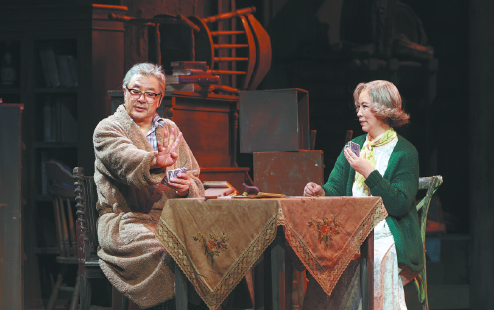Play puts cards on the table
Chinese version of Pulitzer prize-winning The Gin Game returns to stage after a five-year hiatus, Chen Nan reports.

The stage is set with just two characters, playing 14 rounds of a card game — a seemingly simple scene that captivates audiences for over two hours. This is the essence of the Chinese play, The Gin Game, which, directed by Tang Ye and starring Pu Cunxin and Gong Lijun, is being staged at the Cao Yu Theater from June 3 till next Tuesday.
The stage production, adapted from the two-act play originally penned by American playwright D.L. Coburn, is produced by the Beijing People's Art Theatre.
After a five-year hiatus following its staging at the Daliangshan International Theater Festival in 2020, this Chinese version of The Gin Game has returned to the stage, marking the 73rd anniversary of the Beijing People's Art Theatre.
The Gin Game was Coburn's first play and won the Pulitzer Prize for drama in 1978, the same year it was published.
The Chinese version of the play made its premiere in 1985 at the Beijing People's Art Theatre, translated by renowned Chinese American actress and producer Lisa Lu, or Lu Yan. This production, starring actors such as Yu Shizhi and Zhu Lin, marked the first "two-person play" in the theater's history. In 2014, director Tang, along with actors Pu and Gong, revived this classic on stage.
At the heart of the play lies a poignant narrative set in a nursing home, where two elderly individuals, left alone and forgotten, meet and engage in a card game. Each round of the card game serves as a window into the psychological states and life circumstances of the characters, according to director Tang.
"They are like abandoned souls, much like the discarded items in the nursing home where they live," says Tang. "The audience witnesses how these two lonely old people grow closer, drift apart, and ultimately support each other through a game that mirrors the trajectory of their entire lives."
Tang also notes that after five years, everyone's life circumstances have changed. "Rereading the script brought new feelings and helped us discover previously unnoticed details," she explains.
Though the Chinese version of The Gin Game is primarily a comedy, it carries a bittersweet undertone that resonates deeply with audiences.
"I didn't want the play to feel overly tragic this time," says Tang. "That's why we added a note of warmth at the end — a glimmer of hope. This is our interpretation, aiming to show that even when there's nowhere to go and no way forward, there is still a corner that belongs to you."
Pu, 71, who plays Weller Martin — a retired man in his 70s who is cynical and carries a deep sense of frustration — explains that while his age aligns with that of the character, their life experiences are vastly different.
"Weller is dissatisfied with his life and seems to use the card game as a way to balance his inner discontent," says Pu. "He keeps talking about luck, which is his way of resisting fate. The challenge for me is to deliver his coarse, angry lines in a way that feels both authentic and interesting."
For Gong, 61, who portrays Fonsia Dorsey — a widow who had been a teacher and is confronting the harsh realities of old age — the role has taken on new meaning.
"Five years ago, I had to consciously 'act' old," she says. "But this time, I no longer need to put on an aging persona. Fonsia is in her 70s, and I am quite close to that age now. I've constantly reminded myself not to 'pretend' to be old, but to truly understand the character's inner world."
Tang notes that when the Chinese stage production of The Gin Game first premiered in 1985, the concept of nursing homes was relatively unfamiliar to Chinese audiences. However, nearly four decades later, the issue of elderly care has become a significant societal concern, making the play more relevant today.
"The production reflects certain social phenomena through the lives of these elderly characters, particularly how the elderly interact with their family members and strangers," says Tang. "We hope this play helps people gain a deeper understanding of the reality and emotional world of the elderly. After all, everyone will grow old, and aging is something we all must face."


Today's Top News
- The farmer, the snake and Japan's memory hole
- Crossing a milestone in the journey called Sinology
- China-Russia media forum held in Beijing
- Where mobility will drive China and the West
- HK community strongly supports Lai's conviction
- Japan paying high price for PM's rhetoric






























